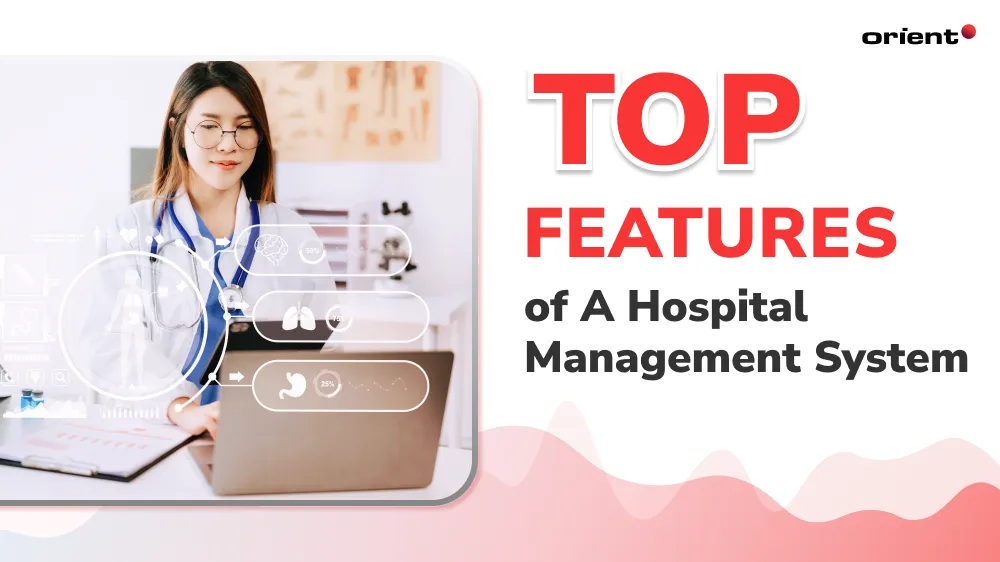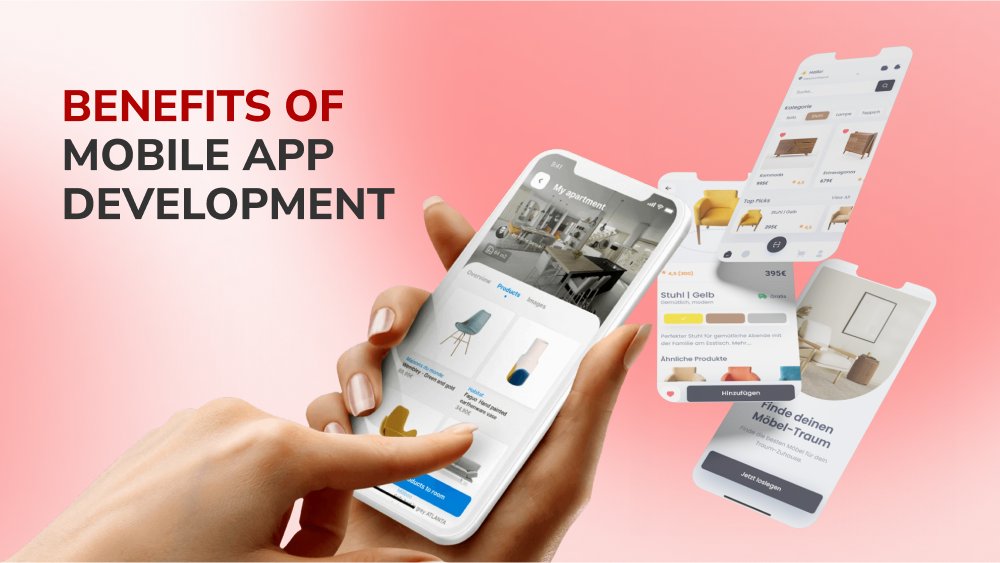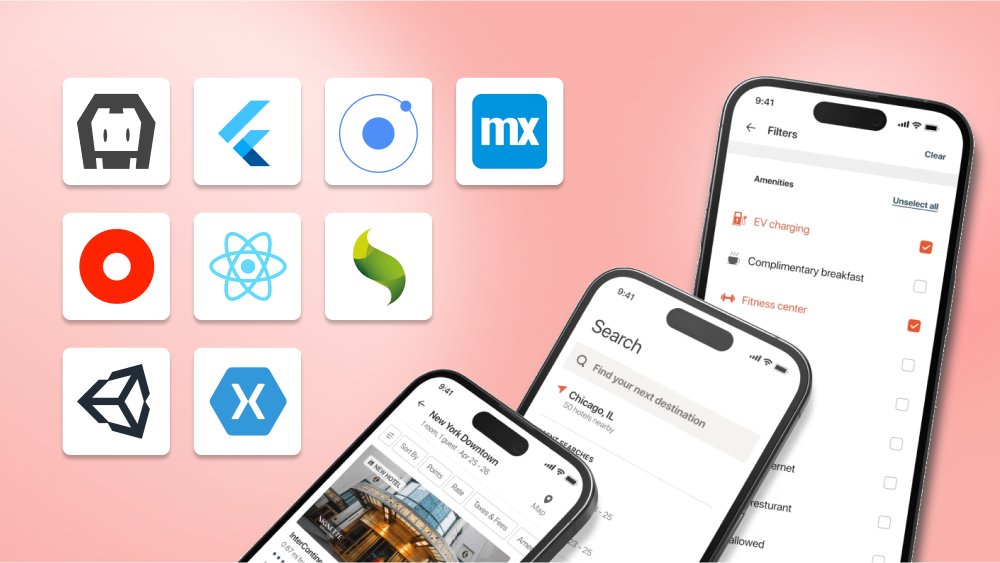Advance Healthcare Operations: Top Features of a Hospital Management System

Content Map
More chaptersHospitals are complex institutions, with hundreds of processes running parallel. A study showed that healthcare providers spend 35% of their time documenting patient data. With the advent of digital transformation, hospitals have the potential to make better decisions in many areas of operations.
Enter the digital revolution in hospital management software. Hospital Management Systems (HMS) is revolutionizing the way hospitals function, empowering healthcare providers worldwide to transform fragmented workflows, aggregate insights, and coordinate coordinated care like never before. These systems are not just a trend but a necessity in our data-driven world. Over 6,200 hospitals and 400 healthcare systems are already leveraging data for health innovation.
Here, we examine the top features of hospital management system software that are revolutionizing healthcare operations behind the scenes. Discover automated check-ins, executive reporting, and telemedicine tools revolutionizing access. Read on for a review of electronic medical records, inventory control, and more innovations blurring boundaries to optimize the patient experience from start to finish. Your prescription for progress awaits!
Patient Registration and Electronic Health Records (EHR)

Patient registration is the initial step in any healthcare delivery process. In a traditional setup, this involves manual data entry, which can potentially be prone to errors and time-consuming. However, with healthcare management systems, the patient registration process becomes efficient and error-free. The system captures all necessary patient details, such as personal information, medical history, and insurance details, in a structured and standardized format. This not only speeds up the registration process but also ensures that all patient data is accurately recorded.
The second component, Electronic Health Records (EHR), is a digital version of a patient’s medical history. It includes various details like diagnoses, treatment plans, medications, immunization dates, allergies, radiology images, and laboratory test results. The HMS stores these patient records in a centralized database, replacing the traditional paper-based records.
The integration of the Electronic Medical Record (EMR) within the HMS allows healthcare providers to access and retrieve patient information quickly and securely. This feature is particularly beneficial in emergencies when immediate access to a patient’s medical history can significantly impact the treatment’s outcome.
The combination of efficient patient registration and integrated digital patient health records in an HMS leads to several benefits. It improves the quality of patient management by providing accurate and up-to-date clinical data. It enhances operational efficiency by eliminating manual and redundant tasks. It also aids in regulatory compliance by maintaining comprehensive and standardized records.
Supply Chain and Inventory Management
This feature provides a comprehensive solution for managing all aspects of a hospital’s supply chain, from procurement to consumption. It allows hospitals to maintain optimal inventory levels of essential items such as medicines, personal protective equipment (PPE), surgical equipment, and other medical supplies.
The HMS tracks the inventory in real time, providing visibility into stock levels, expiry dates, and the location of items within the hospital. This helps prevent stock-outs and wastage due to expired products, ensuring that necessary supplies are always available when needed.
Moreover, the system automates the procurement process. When inventory levels fall below a certain threshold, the HMS can automatically generate purchase orders for the required items, taking into account factors such as lead time and minimum order quantities. This not only saves time but also reduces the risk of human error in order placement.
The supply chain and inventory management feature also facilitates the management of suppliers. It maintains a database of supplier information, tracks purchase history, and evaluates supplier performance based on various criteria such as delivery time and product quality. This information can be then used to negotiate better terms with suppliers and help make informed decisions about supplier selection.
Billing and Revenue Cycle Management
The HMS’s billing feature automates the entire billing process, from patient registration to final payment. It automatically generates invoices based on the services provided, including consultations, procedures, medications, and hospital stays. The system can also handle different payment methods, such as cash, credit/debit cards, and insurance claims, making it versatile and user-friendly.
The revenue cycle management feature of the HMS is designed to optimize the hospital’s revenue cycle. It tracks patient care episodes from registration and appointment scheduling to the final payment of a balance. The system ensures that the financial aspects of patient care are handled efficiently, reducing the time between service delivery and payment collection.
The integration of Medical Billing Software within the HMS is a game-changer. It simplifies the coding and billing process, ensuring accurate billing and reducing errors. The software can automatically verify insurance eligibility, submit claims, and follow up on unpaid claims. It also provides detailed reports on billing activities, helping hospitals identify trends, monitor performance, and make informed decisions.
Moreover, the HMS can handle complex insurance processes. It can manage pre-authorizations, claims submissions, and remittances. The system can also interact with insurance company systems to check patient eligibility and claim status, reducing the administrative burden on hospital staff.
Laboratory and Diagnostic Management

This feature provides an integrated platform for managing all laboratory and diagnostic procedures. It allows healthcare professionals to order tests, track samples, and view results in real-time. The system can handle multiple tests, from simple blood tests to complex radiology scans.
The HMS automates the entire workflow of a laboratory or diagnostic center. When a healthcare professional orders a test, the system generates a unique identifier for the sample. This identifier is used to track the sample throughout the testing process, ensuring that there are no mix-ups or errors.
Once the tests are done, the results are automatically uploaded to the HMS. These results are then linked to the patient’s Electronic Health Record (EHR), making them easily accessible to healthcare professionals. This not only speeds up the diagnostic process but also ensures that doctors have the most up-to-date information when making treatment decisions.
Moreover, the Laboratory and Diagnostic Management feature of an HMS can also manage the inventory of a laboratory. It can track the usage of reagents and other consumables, alerting staff when stocks are low. This helps prevent delays in testing due to lack of supplies.
Data Analytics and Reporting
In the era of big data, the ability to analyze and interpret vast volumes of information is crucial, especially in the healthcare sector. This feature transforms raw data into meaningful insights. It collects data from various sources within the hospital, such as patient records, billing, inventory, and more. The system then processes this data to identify patterns, trends, and correlations. For example, it can analyze patient data to identify common health issues, monitor disease outbreaks, or track patient outcomes.
The HMS uses advanced analytics algorithms to generate these insights. These algorithms can handle both structured data (such as patient age or diagnosis) and unstructured data (such as doctor’s notes or medical images). This allows the system to provide a comprehensive view of the hospital’s operations.
The reporting aspect of this feature is equally important. The HMS can generate a wide range of reports, from daily operational reports to strategic reports for decision-making. These reports can be customized effectively to meet the unique needs of different users, such as doctors, nurses, administrators, and even patients.
For instance, a doctor might need a report on their patients’ progress, while an administrator might need a report on hospital occupancy rates. The system can also generate regulatory reports to ensure compliance with healthcare standards and laws.
Moreover, the system provides real-time reporting capabilities. This means that users can efficiently access up-to-date information at any time, enabling them to make timely decisions.
Security and Privacy Measures
Hospital management systems are entrusted with a vast amount of sensitive patient data. Protecting this information is paramount, not only for legal compliance but also to maintain patient trust. A robust HMS prioritizes security and privacy through a multi-layered approach:
Ensuring Data Security and Compliance with Privacy Regulations
An HMS is designed to ensure the highest level of compliance with privacy regulations and data security. It adheres to standards such as the Health Insurance Portability and Accountability Act (HIPAA) and the General Data Protection Regulation (GDPR), which set stringent rules for the handling of patient data. The system uses advanced encryption techniques to protect related data both at rest and in transit, ensuring that patient information always remains secure and confidential from unauthorized access.
Access Controls and User Authentication
Access control and user authentication are vital components of an HMS’s security measures. The system employs role-based access control, which means that users can only access information that is relevant to their role. For example, a doctor would have access to their patients’ medical records, but not to billing information.
User authentication mechanisms, including passwords, biometrics, or two-factor authentication, are used to verify the user’s identity before they can access the system. This ensures that only authorized individuals have the right to access sensitive patient information, thereby protecting patient privacy.
Data Backup and Disaster Recovery Mechanisms
Data backup and disaster recovery mechanisms are essential for any HMS. These mechanisms ensure that data is regularly backed up and can be conveniently restored in the event of a data loss incident or a system failure.
The HMS typically includes automated backup processes that create copies of data at regular intervals. These backups are stored in secure locations, often off-site or in the cloud, to protect against data loss due to local disasters.
In the event of a system failure, the HMS’s disaster recovery mechanisms enable quick restoration of services and data. This ensures continuity of care and minimizes disruption to hospital operations.
How Orient Software Helps You Acquire the Benefits of an HMS
The modern healthcare landscape demands efficiency, accuracy, and a focus on patient-centered care. A HMS equipped with the features explored in this article is no longer a luxury but a necessity. From streamlined patient registration and electronic health records to robust security and privacy measures, an HMS empowers your facility to:
- Enhance Patient Experiences: Reduce wait times, improve communication, and empower patients to be active participants in their care.
- Optimize Operations: Streamline workflows, eliminate administrative burdens, and empower staff to focus on what matters most – patient care.
- Boost Accuracy and Safety: Minimize errors, ensure data integrity, and promote better care coordination for improved patient outcomes.
However, the effectiveness of an HMS lies in its features and how well they are tailored to meet the unique needs of a healthcare facility. Here’s where developing custom software becomes beneficial.
If you’re considering developing your own HMS with desired features, look no further than Orient Software. As an expert in custom software development, Orient Software can help you design an HMS that is perfectly suited to your needs. With our expertise, you can leverage the power of technology to advance your healthcare operations and provide exceptional care to your patients. Together, let’s build a better future for patient care.







